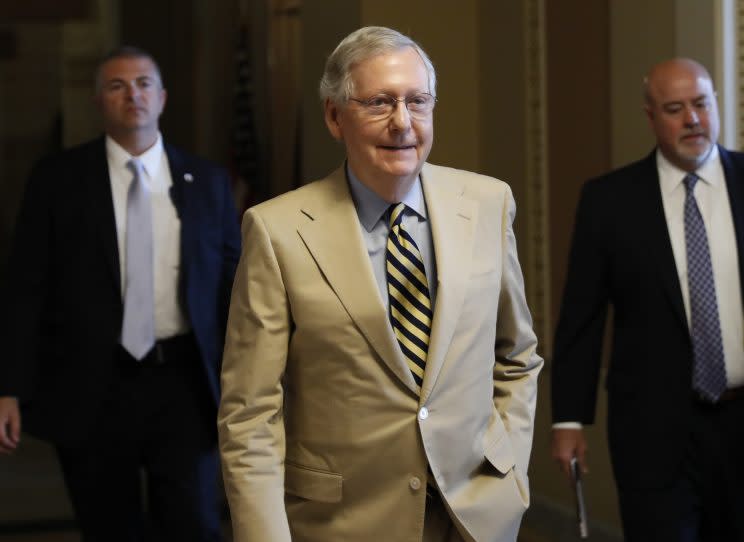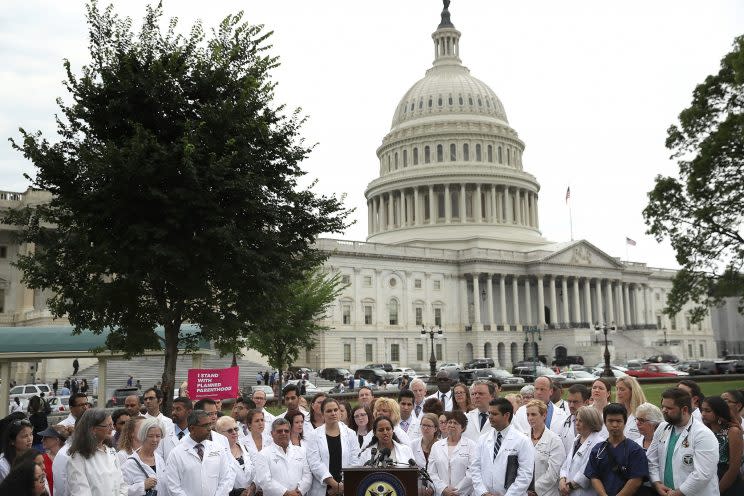CBO: Senate health bill leads to 22 million fewer insured Americans by 2026
WASHINGTON — The Senate health care bill would cause 22 million more people to be uninsured by 2026 than under current law, the nonpartisan Congressional Budget Office announced Monday. The dismal CBO score could foil Senate Majority Leader Mitch McConnell’s plan to rush the sweeping legislation to the floor before July 4.
The CBO previously ignited a firestorm when it predicted that the House’s version of health care reform would result in 23 million fewer Americans having health insurance in 2026, compared to current law. Despite weeks of work, the Senate only managed to shave that number by one million, which could spell trouble for moderates who’ve expressed concerns about coverage loss.
The CBO predicts 15 million more people would be uninsured by 2018 alone — mostly due to the bill dropping Obamacare’s individual mandate. Later coverage losses would be due to Medicaid cuts, since the CBO predicts few low income people would be able to afford coverage on the exchanges once they lost Medicaid.

The Senate bill does, however, reduce the deficit by $321 billion over 10 years — significantly more than the House version, which saved $119 billion. The reduction comes from steep cuts to Medicaid and in subsidies. The Senate bill also would lower premiums on the exchanges by 20 percent over 10 years, compared to current law, but the health care plans available would cover less, most likely leading to higher out-of-pocket costs overall.
Two GOP moderates, Sen. Susan Collins, R-Maine, and Sen. Lisa Murkowski, R-Alaska, have said the CBO’s estimate of uninsured will be important in how they decide whether to support the bill. A pro-Obamacare group already ran attack ads targeting both senators and other moderates using the CBO’s score of the House bill. Last week, Collins called the CBO analysis “all important,” and said she cannot support a bill that causes tens of millions of Americans to lose coverage.
Collins tweeted Monday evening that she would vote against advancing the bill based on the CBO score.
I want to work w/ my GOP & Dem colleagues to fix the flaws in ACA. CBO analysis shows Senate bill won't do it. I will vote no on mtp. 1/3
— Sen. Susan Collins (@SenatorCollins) June 26, 2017
Sen. Dean Heller, R-Nev., announced his opposition to the legislation last Friday, saying it would cause too many Nevadans to lose coverage. But four Senate conservatives — Rand Paul, R-Ky., Mike Lee, R-Utah, Ron Johnson, R-Wis., and Ted Cruz, R-Texas — have said they’re not backing the bill unless it moves to the right. McConnell needs at least 50 of his caucus’ 52 Republicans to support the bill for it to pass, and any policy shift to appease the conservative holdouts could cause more moderate GOP lawmakers to balk.

But the $200 billion in extra deficit savings gives McConnell some room to deal with moderates, potentially adding money for opioid treatment or other care to attract their votes. The bill must save at least as much as the House version in order to pass via reconciliation–a budget procedure that requires just 51 votes to proceed instead of 60.
Some Senate Republicans will likely push back against how the CBO scored their legislation, attempting to discredit the nonpartisan analysis. Health and Human Services Secretary Tom Price said in an interview on Sunday that the CBO is “not accurate.” They will also likely tout the improved deficit reduction number. McConnell said in a statement the report “confirmed” the bill lowers taxes and premiums.
“Our plan will help address Obamacare’s ballooning costs for consumers by lowering premiums over time and cutting taxes, and today’s estimate confirms that,” Sen. John Cornyn, R-Texas, said in a statement about the score. Cornyn is in charge of whipping votes for the bill.
Democrats, meanwhile, pounced on the score. Sen. Bob Casey, D-Pa., called the report “obscene.” Sen. Ron Wyden, D-Ore., said it would take a “wrecking ball” to working families in order to finance a tax cut for the rich. And Minority Leader Chuck Schumer, D-N.Y., said the score proved the Senate bill is as “mean” as the House version.
On Monday, Senate leadership changed the bill to add a six-month lockout period for people who have been uninsured for more than 63 days. That penalty for uninsured people is supposed to discourage healthy people from waiting to get sick to buy insurance, which could cause a “death spiral” of rising premiums on the exchanges.
Read more from Yahoo News:


